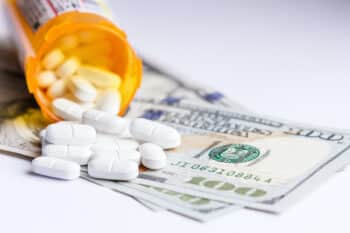The Price Of Opioid Addiction

The Annual Cost Of Opioid Addiction
Opioid Addiction comes with a heavy price tag, both for the individual and society at large. In the US alone, the annual cost of Opioid misuse, including healthcare, lost productivity, addiction treatment, and criminal justice involvement, was estimated to be $1.5 trillion in 2020.
Price Of Common Opioids
The financial strain imposed by Opioid addiction is vast, influenced in part by the varying costs of different Opioids.
Here’s a closer look:
Prescription Opioids: These are medications typically prescribed to manage pain. Their street value can fluctuate drastically based on availability and region. On average, they might range from $1 to $30 per pill. Examples include:
Oxycodone (e.g., OxyContin, Percocet): Depending on strength and formulation, a pill can cost anywhere from $5 to $50 on the street.
Hydrocodone (e.g., Vicodin): Prices can vary between $5 and $20 per pill.
Morphine: A popular choice for pain management, Morphine can range from $10 to $100 for extended-release tablets.
Fentanyl: This synthetic Opioid is incredibly potent, estimated to be 50-100 times more potent than Morphine and about 50 times more potent than Heroin. Illegally produced Fentanyl has been a significant factor in Opioid-related overdose deaths. A small 1-milligram dose can cost between $20 and $40, but given its potency, even this small amount is dangerous.
Heroin: Though not a prescription medication, Heroin is an illegal Opioid that has seen widespread misuse. The cost can vary widely based on purity and region, but a single dose (or “bag”) typically ranges from $5 to $20.
Methadone: Used legally as a treatment for Opioid addiction, Methadone has also been misused illicitly. The street price for Methadone can range from $10 to $30 per dose.
Codeine: Often found in prescription cough syrups, its recreational misuse has led to a street market. A pint of Codeine-based cough syrup can cost upwards of $200, depending on the brand and formulation.
Understanding the costs of these drugs provides insight into the economic burden faced by those with Opioid addiction. As tolerance builds, individuals may find themselves spending increasing amounts of money to sustain their addiction, leading to further financial strain and potential legal consequences.
Cost Of The Opioid Epidemic
Beyond the individual, the wider societal costs are staggering. The healthcare system is burdened with emergency department visits, overdose treatments, and long-term health complications due to Opioid use. Furthermore, law enforcement and criminal justice systems face mounting pressures as they tackle drug trafficking and related crimes. Overall, the economic burden from the Opioid epidemic equates to 3.4% of the U.S.’s GDP.
Non-Monetary Costs
While the financial costs are immense, the non-monetary costs are heart-wrenching and, in many cases, irreversible.
- Impact On Relationships: Opioid addiction doesn’t just impact the individual; it ripples out, straining relationships with family, friends, and partners.
- Job Loss: The struggle with addiction can lead to decreased productivity, increased absenteeism, and, ultimately, job loss. The loss of a stable income further compounds the financial strain.
- Emotional Toll: The emotional turmoil of Opioid addiction cannot be understated. Individuals often grapple with feelings of guilt, shame, and despair. These emotional challenges can lead to further isolation, exacerbating feelings of loneliness and hopelessness.
- Impact on Physical Health: Long-term Opioid use can have profound implications for one’s physical health. Chronic users often experience respiratory depression, gastrointestinal issues, decreased immune response, and a higher susceptibility to infectious diseases. Additionally, the risk of experiencing a fatal Opioid overdose rises with prolonged use.
- Deaths: One of the most tragic costs of the Opioid epidemic is the loss of life. In 2021, 80,411 people in the US died from Opioid-involved overdoses.
Seeking Treatment: A New Beginning
If you or a loved one is struggling with Opioid addiction, it’s imperative to remember that help is available. Reaching out for support is a sign of strength, not weakness. Treatment provides a foundation for mending broken relationships, regaining physical health, and rebuilding one’s life.
Contact a treatment provider today and take your first steps toward an addiction-free future.